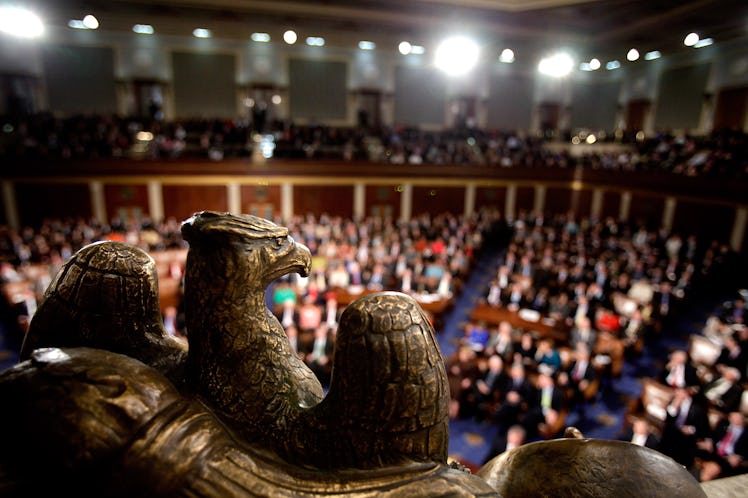
This Is What It Would Take To Get Rid Of The Electoral College
The 2020 election may still be months away, but people are already looking to the future, and one of the things that keeps coming up is the election process itself. In recent months, multiple 2020 Democratic presidential candidates have called for the abolishment of the Electoral College, arguing that many voters don't feel like their voices are heard under the current system. But can the Electoral College be eliminated? Let's just say it wouldn't be easy.
The Electoral College, which ultimately determines who wins the presidency, has been the subject of controversy in recent months, with Democratic presidential candidates such as Massachusetts Sen. Elizabeth Warren and Vermont Sen. Bernie Sanders calling for its elimination. “I believe we need a constitutional amendment that protects the right to vote for every American citizen and makes sure that vote gets counted,” Warren said at a CNN town hall in March. Even Supreme Court Justice Ruth Bader Ginsburg recently brought up getting rid of the Electoral College (although she also called it "largely a dream," which is a clue to how likely it is).
The Electoral College, not the popular vote, is what ultimately chooses a president. In the system, each state has a designated number of "electors" based on the state's population, who ultimately determine who will win the presidency. There are 538 electors in the Electoral College, and the candidate who wins the majority of their votes wins the election. All but two states have a winner-take-all system in place, which means that electors are required to vote for the candidate who wins their state's popular vote. That means that a given candidate could win a state popular vote by a slim margin, but get all of the electors' votes. If it happens in enough states, it's possible to win the election without actually winning a majority of the national vote. That's how Trump was able to win the presidency despite losing the popular vote to Clinton by nearly 3 million votes — and that's why some progressives are trying to abolish the Electoral College.
But it wouldn't be easy to get rid of it. The Electoral College is enshrined in the Constitution, and the Constitution can only be changed through an official amendment. Abolishing the Electoral College would therefore require the proposal of an amendment to do so — and then, the approval of legislators and states to enact it. Article V of the Constitution states that any decision to change the Constitution must first be approved by either two-thirds of the Senate and the House, or by two-thirds of the 50 state legislatures through a constitutional convention. Then, in order for the proposed amendment to be ratified, three-fourths of the states must approve it, either via their state legislature or a statewide ratifying convention.
Getting two-thirds of the states to agree on amending the Constitution in the first place is already a difficult task. But getting three-fourths of the state to vote in favor of something — especially something as contentious as the elimination of the Electoral College — is a particularly tall order. To avoid going through this extremely long process, some states have devised an alternate method to circumvent the Electoral College without actually abolishing it.
Ever since Clinton lost the 2016 presidential election despite winning the national popular vote, several states have passed laws requiring electors to cast their votes for whichever candidate wins the national popular vote, rather than just the state popular vote. This effort is known as the National Popular Vote Interstate Compact, the compact's official website states that 16 states — with a total of 196 electoral votes — have passed legislation like this. The goal of the compact is to eliminate the Electoral College's influence in a presidential election. Once enough states have passed laws to award a total of 270 electoral votes to the winner of the national popular vote — the minimum number required to win the election — the compact would go into effect, and the Electoral College would no longer have the same power as before.
Given how difficult it is to propose and ratify a Constitutional amendment to do so, it's unlikely that the Electoral College will be abolished ahead of the 2020 election. What is clear, however, is that progressives in various states will continue pushing for legislation to take away the Electoral College's power — and maybe, just maybe, it will no longer be a deciding factor in future elections.